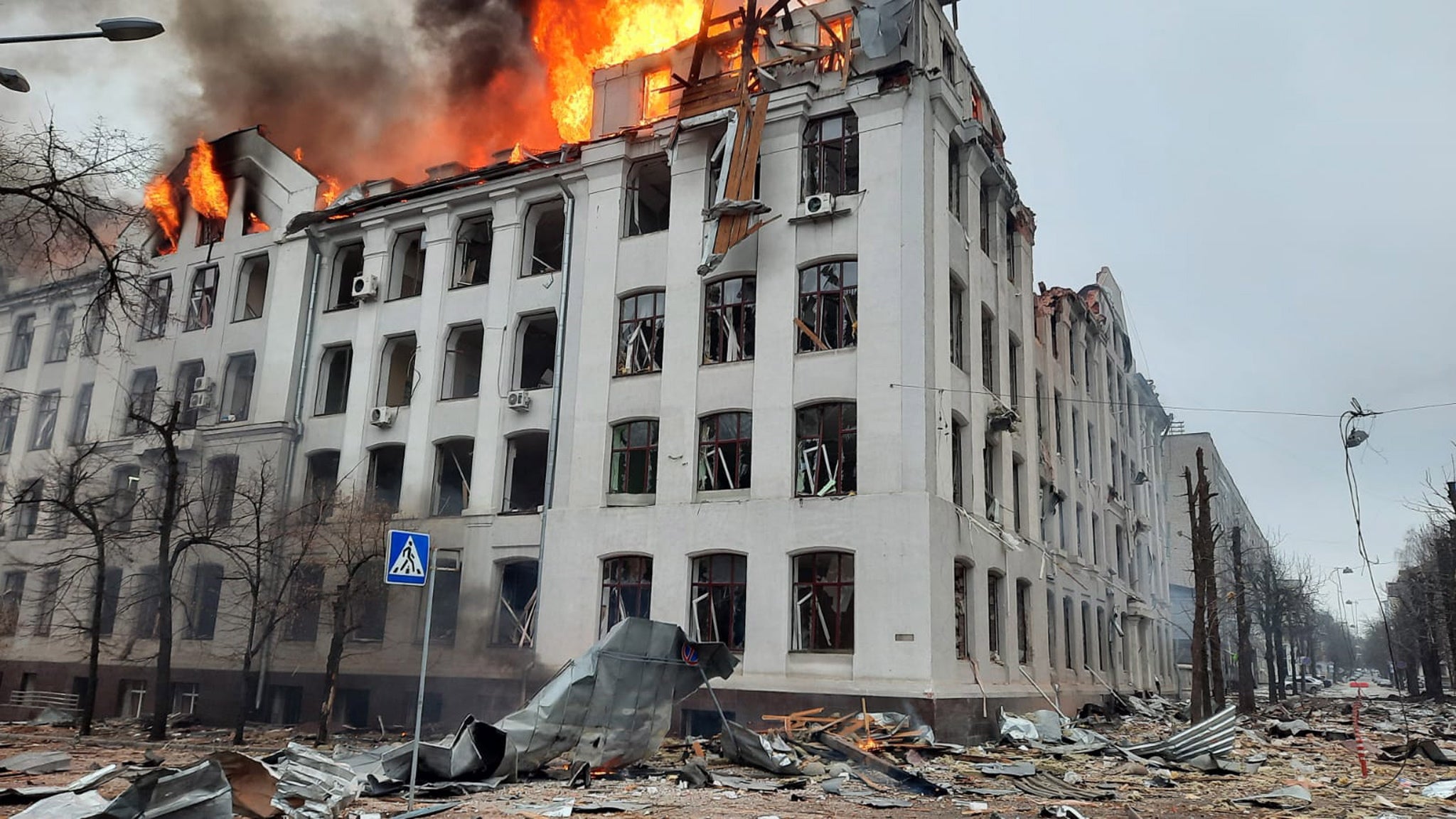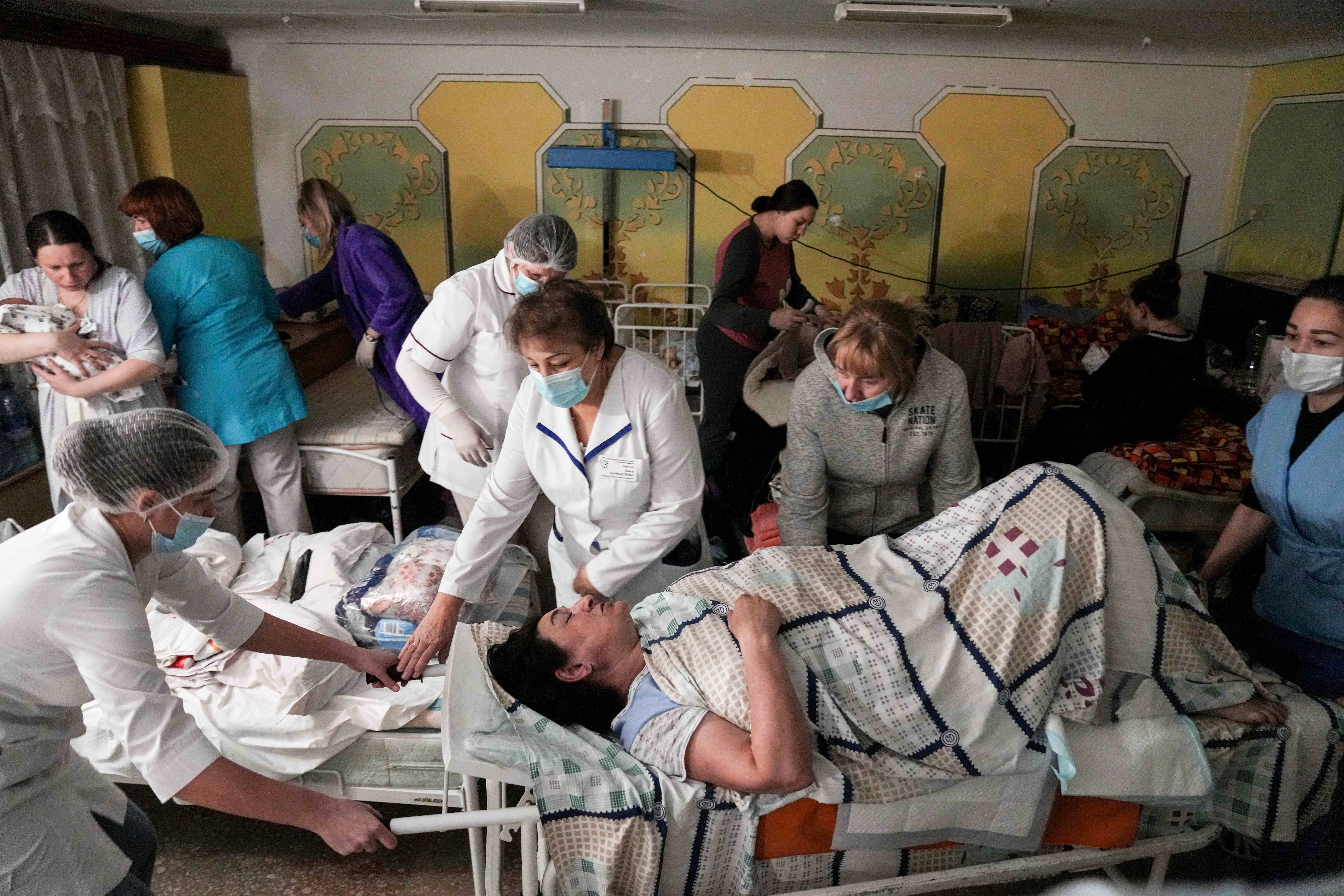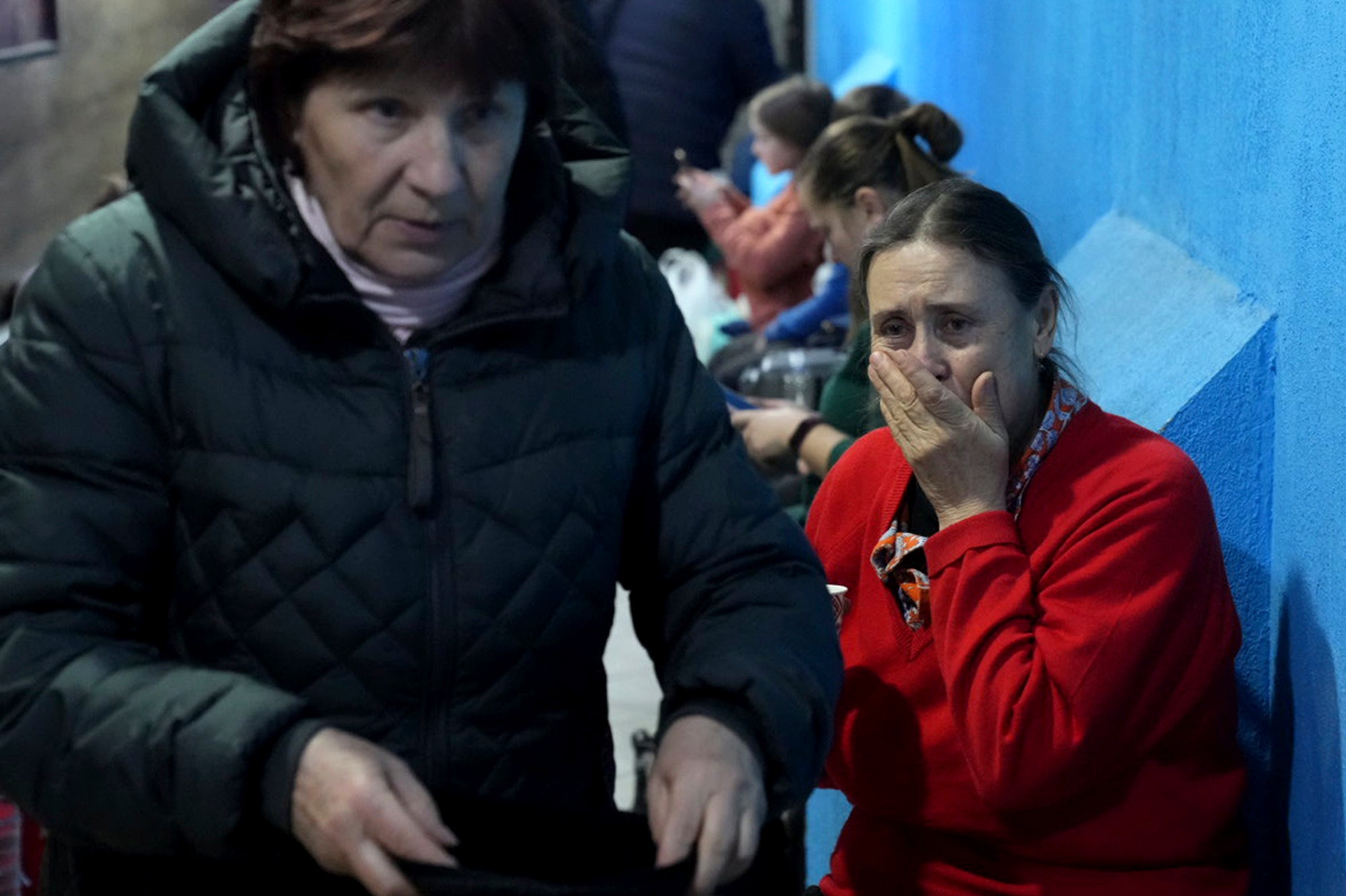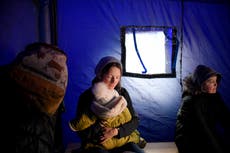Civilian deaths soar as Russian forces bombard key Ukraine cities
Ukraine says 2,000 civilians have died in the first week of fighting

Fierce fighting and a sharply growing death toll signal an increasingly bloody conflict in Ukraine, with Russian troops continuing to storm cities while building up a massive force of tanks and artillery in preparation to lay siege to Kyiv.
A week into the war, Ukraine claimed that more than 2,000 of its civilians had been killed during the first week of the Russian invasion, while Moscow announced that it had so far lost 498 soldiers in the war – the first time it has given a figure.
Ukraine’s military maintains that around 6,000 Russians have been killed since the fighting began, while its emergency services say transport facilities, hospitals, kindergartens and homes have been destroyed.
Urban centres are increasingly under attack, with Russian shelling targeting several cities including Kharkiv, Kherson and Mariupol. There were also reports of explosions in Kyiv last night, including a huge blast at the capital’s main railway station.
With the Kremlin pouring more and more forces into the conflict, and a steady ratcheting up of air and artillery strikes, Ukraine’s president Volodymyr Zelensky said Vladimir Putin was giving orders “to erase us all, erase our country, erase our history”.
Adding to the sense of growing chaos and a looming humanitarian disaster in the heart of Europe, the UN reported that more than 874,000 people had now fled Ukraine since the invasion began.
Kharkiv has been turned into a desolate landscape of smashed and burning buildings and gouged roads after days of fighting, as Russian forces, led by paratroopers, pushed deeper into the centre with repeated air strikes on the defending Ukrainian soldiers.
The 1.5 million inhabitants of the city, which was meant to become the centre of Ukraine’s new Silicon Valley, have either fled or are seeking refuge in shelters amid the bombardment.
The city’s mayor, Ihor Terekhov, said in an online video statement that Russia’s actions amounted to “genocide”.
“Kharkiv is a Russian-speaking city. Every fourth person in Kharkiv has relatives in the Russian Federation. We never expected this could happen: total destruction, annihilation, genocide against the Ukrainian people – this is unforgivable.”
Two port cities, Kherson and Mariupol, have faced intense attacks. Russia on Wednesday night claimed - as it did on Tuesday - that it had seized Kherson, saying that Vladimir Putin’s troops were in “complete control” of the city.
However, Ukrainian president Volodymyr Zelensky’s office said late in the evening that fighting was still ongoing. Kherson’s mayor, Igor Kolykhayev, revealed that Russian troops were on the street and had forced their way into the city council building.
After meeting with armed troops, Mr Kolykhayev announced several conditions that would allow the city to remain, at least ostensibly, under Ukraine control - including a curfew and residents only being allowed in the company of one other person outside.
He said in a post on Facebook: “Ukrainian flag above us. And to keep it the same, these requirements must be met. I have nothing else to offer yet.”
The Ukrainian military earlier said they were expecting amphibious landings by enemy forces along the Black Sea coast in Odesa and Zatoka.
According to the Ukrainian authorities, there were also attempts by the Russians to capture Chernihiv, lying between Kyiv and the border with Belarus, along one of the main routes being taken by Moscow’s forces heading towards the capital. A number of administrative buildings, along with water and electricity supply facilities, were damaged by rocket fire.
Sergei Lavrov, Russia’s foreign minister, added to an apocalyptic vision of the future by warning that a third world war would mean the use of nuclear weapons. President Putin has placed his country’s nuclear force on a state of high alert.

The conflict has led the International Atomic Energy Agency (IAEA) to express grave concerns over safety following fighting around the Zaporizhzhia nuclear power plant.
The Russian government told the IAEA that its forces had taken control of the facility, the workforce had returned, and radiation levels “remain normal”.
Zaporizhzhia is Europe’s largest nuclear power plant and is the base for six of Ukraine’s 15 nuclear energy reactors. Local people have been building roadblocks in the area to try to block Russian troops for two days.
As the fighting continues, a second round of ceasefire negotiations is due to take place between Russia and Ukraine near the Belarus border. Kremlin spokesperson Dmitry Peskov said: “In the second half of the day, closer to evening, our delegation will be in place to await Ukrainian negotiators.”
Mr Peskov refused to reveal the location of the meeting. There is little optimism that the negotiations will lead to an end to hostilities, after it was reported that no common ground had been reached at the first round of talks on Monday.
The Kremlin’s offers of peace talks were viewed as risible by many of those on the receiving end of Russian shelling.
In Kharkiv, Viktoria Burick, a 22-year-old student, told The Independent: “It is a joke, a very sick joke. How can they even speak of peace when they are bombing us day and night, ordinary people are getting killed and injured?
“My grandmother, she is 68, has had to live underground for the last two days in a shelter. There is no heating, no food, no water. My little brother and sister are terrified. I don’t believe Russians want peace at all, they are trying to fool the world.”
The mayor of Mariupol, Vadym Boichenko, spoke of the possibility of mass casualties after Russian troops blocked exit routes while continuing to attack.

“They are flattening us non-stop for 12 hours now. The enemy occupying forces of the Russian Federation have done everything to block the exit of civilians from the city of half a million people,” he said.
“We cannot even take the wounded from the streets, from houses and apartments today, since the shelling does not stop.
“Our railway link has been cut – they even went to the railway station and fired on our diesel locomotives so that people can’t be evacuated. So their mission is to destroy us; they have no intention of helping civilians.”
Meanwhile, the crackdown on dissent about the war continued in Russia, with independent media outlets being shut down. A group of primary school children were reported to have been arrested after holding up signs saying “No to war”.
Photographs appeared of the children with police officers behind the metal bars of a police van, and then at a police station. Novaya Gazeta, the Nobel Prize-winning newspaper, later reported that the children had been released.
Join our commenting forum
Join thought-provoking conversations, follow other Independent readers and see their replies
Comments


Bookmark popover
Removed from bookmarks